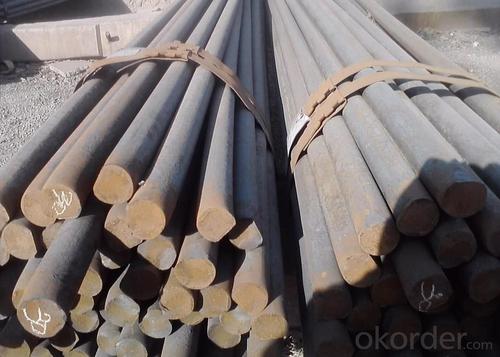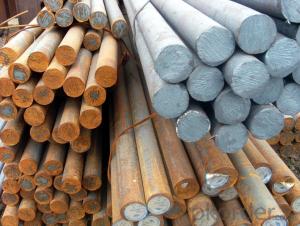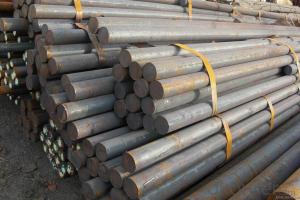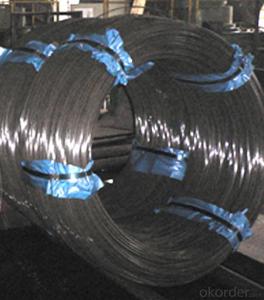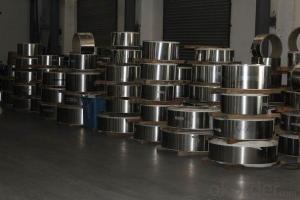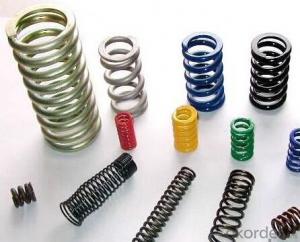HR Spring Steel
- Loading Port:
- China Main Port
- Payment Terms:
- TT or LC
- Min Order Qty:
- 50Tons m.t.
- Supply Capability:
- 600000TONS/YEAR m.t./month
OKorder Service Pledge
OKorder Financial Service
You Might Also Like
Spring Steel can be divided into two types. One is carbon spring steel, and other one is alloy spring steel.
Alloy spring steel is based on carbon spring steel, by adding one or more alloying elements to improve the mechanical properties, hardenability and other properties to meet the requirement for manufacturing all kinds of spring steel.
Specification of HR Spring Steel:
-Material: 65Mn
-Standard: GB
-Type: Spring Steel
Chemical Composition:
C | Si | Mn | S |
0.63~0.65 | 0.19~0.22 | 0.98~1.10 | ≤0.01 |
P | Cr | Ni | Cu |
≤0.014 | ≤0.2 | ≤0.02 | ≤0.05 |
Mechanical Properties:
-Tensile Strength σb (MPa): 825~925
-Yield Strength σs (MPa): 520~690
-Elongation δ10(%): 14~21.5
-Percentage reduction of area: ψ (%): ≥10
-Hardness:
1, Hot rolled: 240~270HB
2, Soft state hardness of cold rolled: 190~220HB
3, Hard state hardness of cold rolled: 300~340HB
4, Heat treatment: 38~60HRC
Usage/Applications of HR Spring Steel:
-65Mn, element Mn improves hardenability. Surface decarburizing tendency is less than silicon steel. After heat treatment, the mechanical properties are better than carbon steel.
-Spring steel of this material is usually used as flat and round spring of small size, clockwork spring, spring ring, valve spring, brake spring and so on.
Packaging & Delivery of HR Spring Steel:
-Packing Detail: The products can be packed in bundles by steel wires.
-Marks: We will paint both ends of each bundle of products to make sure that it’s more convenient for customers to distinguish their products from others, besides, we will tie tag marks to the bundles with following information: company name and logo, product name, specification, material, and so on.
-Delivery Detail:
1, Delivery time: 30~45 working days after receive buyer’s T.T. or L/C.
2, Delivery status should be written in the contract. (Heat treatment or no)
Transportation:
1, The products can be delivered by bulk vessel or by container. As for container, products with the length of 6m will be loaded in 20’ container, with 9m or 12m, in 40’ container.
2, The maximum quantity of loading of container is 25 tons.
3, The products are usually transported to the nearest port from the production place.
Photos of HR Spring Steel:
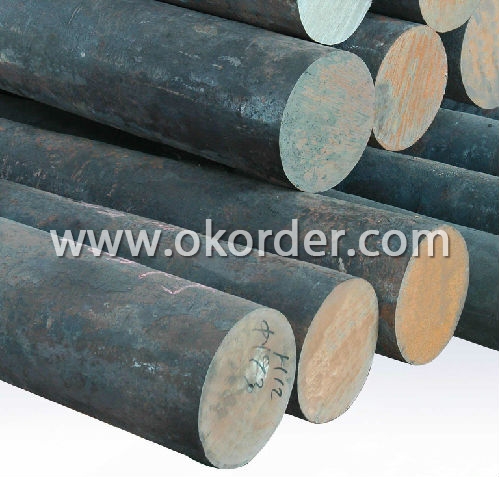
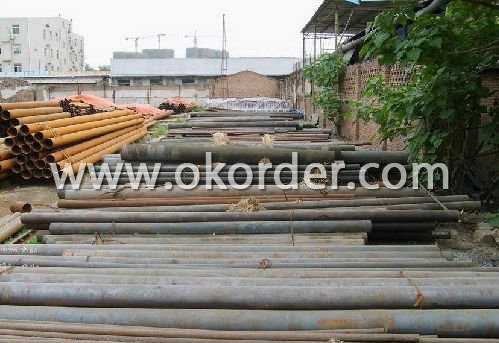
- Q: How is special steel different from regular steel?
- Special steel is different from regular steel in that it is specifically formulated to possess certain enhanced properties and characteristics, such as increased strength, hardness, corrosion resistance, or heat resistance. These unique properties make special steel suitable for various specialized applications where regular steel may not meet the required specifications.
- Q: What are the applications of special steel in the railway industry?
- Special steel has several important applications in the railway industry. It is commonly used for manufacturing railway tracks, as it possesses high strength and durability, ensuring the tracks can withstand heavy loads and frequent use. Additionally, special steel is employed in the construction of railway bridges and tunnels, offering excellent resistance to corrosion and extreme weather conditions. Moreover, special steel is utilized in the production of railway components such as wheels, axles, and couplers, ensuring optimal performance, safety, and longevity of the railway system.
- Q: What are the main applications of special steel in the power storage industry?
- Special steel is widely used in the power storage industry for various applications. One of the main uses is in the manufacturing of battery components, such as battery casings, terminals, and connectors, due to its excellent corrosion resistance and high strength. Special steel is also utilized in the production of power transmission and distribution equipment, including transformers, generators, and turbines, where its superior mechanical properties and durability ensure reliable and efficient power generation and transmission. Additionally, special steel is employed in the construction of power storage structures, such as tanks and containers, providing long-lasting protection against environmental factors and maintaining the integrity of stored energy.
- Q: What are the benefits of using special steel in the energy sector?
- Using special steel in the energy sector comes with various advantages. To begin with, special steel provides exceptional strength and durability, making it the ideal material for constructing different energy infrastructure components like pipelines, pressure vessels, and turbines. Its high tensile strength and resistance to corrosion ensure that these structures can withstand the harsh conditions and pressures encountered in the energy sector, thereby reducing the risk of failures and increasing their lifespan. Additionally, special steel exhibits excellent heat resistance properties, which is crucial in the energy sector where high temperatures are generated. This makes it suitable for applications such as power generation, where it can be used in the construction of boilers, heat exchangers, and nuclear reactors. The ability of special steel to withstand extreme heat without deforming or losing its mechanical properties is vital for ensuring the safe and efficient operation of energy facilities. Furthermore, special steel offers superior weldability and formability, allowing for easier fabrication and assembly of complex energy infrastructure components. This makes it easier and more cost-effective to manufacture and install equipment in the energy sector, reducing both production costs and construction time. Another advantage of using special steel in the energy sector is its resistance to fatigue and cracking. Energy infrastructure components are subjected to cyclic loading and stress, which can lead to fatigue failure over time. The ability of special steel to resist fatigue and crack propagation ensures the long-term reliability and safety of energy infrastructure. Moreover, special steel offers excellent magnetic properties, making it suitable for use in power transmission and electrical equipment. Its magnetic permeability and low electrical resistance allow for efficient transmission and distribution of electricity, reducing energy losses and improving overall system performance. In conclusion, the use of special steel in the energy sector provides enhanced strength, durability, heat resistance, weldability, and fatigue resistance. These properties contribute to the reliability, safety, and efficiency of energy infrastructure, making special steel an invaluable material for the energy sector.
- Q: What are the factors affecting the cost of special steel?
- The cost of special steel can be influenced by various factors. The price of raw materials is one of the primary factors. Special steel often requires specific alloys or additives, which can be expensive to obtain. Any fluctuations in the prices of these raw materials can directly affect the final product's cost. Another factor is the complexity of the manufacturing process. Advanced techniques and machinery are often used to produce special steel, and acquiring and maintaining them can be costly. The more intricate and specialized the manufacturing process, the higher the steel's cost. The demand and supply dynamics also play a role in determining the cost of special steel. If there is high demand but limited supply, the price is likely to go up. Conversely, if there is low demand and excessive supply, the price may decrease. Moreover, the level of customization required for the special steel can impact its cost. If a customer needs specific dimensions, tolerances, or surface finishes, additional processing steps may be necessary, leading to higher costs. Furthermore, transportation and logistics costs can affect the overall cost of special steel. If the steel needs to be transported over long distances or requires specialized handling, these additional expenses can accumulate. Lastly, market conditions and economic factors can influence the cost of special steel. Inflation, currency exchange rates, and overall economic stability can all have an impact on the pricing of special steel. In conclusion, the cost of special steel is determined by a combination of factors, including raw material costs, manufacturing complexity, demand and supply dynamics, customization requirements, transportation and logistics costs, and market conditions.
- Q: How does special steel perform in high-stress corrosion cracking environments?
- Special steel is specifically designed to perform well in high-stress corrosion cracking environments. This type of steel is highly resistant to corrosion and can withstand the combination of stress and corrosive elements present in these environments. Its unique composition and manufacturing process make it more durable and less prone to cracking, ensuring its reliable performance in such challenging conditions.
- Q: How does special steel perform in terms of machinability?
- Special steel typically performs well in terms of machinability. It is specially designed to have improved cutting, drilling, and shaping properties, making it easier to work with using various machining processes. Special steel often has a more consistent composition and structure, which results in reduced tool wear, better surface finish, and increased productivity during machining operations.
- Q: What is the significance of phosphorus in special steel?
- Phosphorus plays a vital role in the production of special steel due to its numerous advantageous properties. To begin with, it acts as a deoxidizer during the steel manufacturing process, thereby eliminating impurities like oxygen. This results in an overall improvement in the quality and purity of the steel, making it more resistant to corrosion and enhancing its mechanical properties. Additionally, phosphorus has the ability to enhance the strength and hardness of the steel, making it ideal for applications that demand durability and resistance to wear. It also aids in improving the steel's machinability, facilitating easier shaping and processing. Moreover, phosphorus contributes to the steel's capacity to retain its strength even at high temperatures, making it suitable for use in environments like power plants or aerospace industries. However, it is crucial to control the concentration of phosphorus within certain limits as excessive levels can have detrimental effects. A high phosphorus content can lead to brittleness, reduced toughness, and decreased weldability of the steel. Therefore, it is necessary to carefully consider and balance the beneficial effects of phosphorus with its potential drawbacks. In conclusion, the significance of phosphorus in special steel lies in its ability to enhance the quality, purity, strength, hardness, machinability, and high-temperature performance of the steel. By controlling the phosphorus content within appropriate limits, manufacturers can produce special steel with improved properties that meet the specific requirements of various industrial applications.
- Q: What are the common alloying elements in special steel?
- Some common alloying elements in special steel include chromium, nickel, molybdenum, and vanadium. Chromium is often added to improve the steel's corrosion resistance and enhance its hardness. Nickel is used to increase the steel's toughness and resistance to extreme temperatures. Molybdenum is another element that is frequently added to enhance the steel's strength and improve its resistance to wear and corrosion. Vanadium is known for its ability to increase the steel's hardness and strength, making it suitable for applications that require high durability. These alloying elements are carefully selected and added to special steel to achieve specific properties and meet the unique requirements of various industries such as automotive, aerospace, and construction.
- Q: How does special steel contribute to the manufacturing of hydraulic components?
- Special steel plays a crucial role in the manufacturing of hydraulic components due to its unique properties and characteristics. Hydraulic components, such as cylinders, pumps, valves, and fittings, work under high pressure and extreme conditions. Therefore, they require materials that can withstand these demanding environments. Special steel, also known as alloy steel, is specifically designed to possess exceptional strength, durability, and resistance to corrosion and wear. These properties make it an ideal material for hydraulic components, as they need to withstand high pressures, constant movement, and exposure to various fluids. The high strength of special steel allows hydraulic components to handle heavy loads and resist deformation, ensuring their long-term reliability and performance. Additionally, the durability of special steel ensures that hydraulic components can endure the continuous stress and movement without experiencing premature failures. Another significant advantage of special steel is its resistance to corrosion and wear. Hydraulic components often come into contact with different fluids, including water, oil, and chemicals. Special steel's resistance to corrosion protects the components from degradation and extends their lifespan. Furthermore, its resistance to wear minimizes the damage caused by friction, ensuring smooth operation and reducing maintenance requirements. Moreover, special steel can be easily machined and formed into complex shapes, allowing for the production of intricate hydraulic components with precise specifications. This versatility enables manufacturers to create components that are tailored to the specific requirements of different hydraulic systems, ensuring optimal performance and efficiency. In conclusion, special steel contributes significantly to the manufacturing of hydraulic components by providing the necessary strength, durability, corrosion resistance, and wear resistance. Its unique properties enable the production of high-quality and reliable hydraulic components that can withstand demanding environments and ensure the smooth operation of hydraulic systems.
1. Manufacturer Overview
| Location | Jiangsu, China |
| Year Established | 2003 |
| Annual Output Value | Above US$ 30 Million |
| Main Markets | Asia-Pacific; Middle east |
| Company Certifications |
2. Manufacturer Certificates
| a) Certification Name | |
| Range | |
| Reference | |
| Validity Period |
3. Manufacturer Capability
| a) Trade Capacity | |
| Nearest Port | Shanghai. |
| Export Percentage | 20% - 30% |
| No.of Employees in Trade Department | 10-20 People |
| Language Spoken: | English; Chinese |
| b) Factory Information | |
| Factory Size: | Above 100,000 square meters |
| No. of Production Lines | 2 |
| Contract Manufacturing | OEM Service Offered; |
| Product Price Range | Average |
Send your message to us
HR Spring Steel
- Loading Port:
- China Main Port
- Payment Terms:
- TT or LC
- Min Order Qty:
- 50Tons m.t.
- Supply Capability:
- 600000TONS/YEAR m.t./month
OKorder Service Pledge
OKorder Financial Service
Similar products
Hot products
Hot Searches
Related keywords



